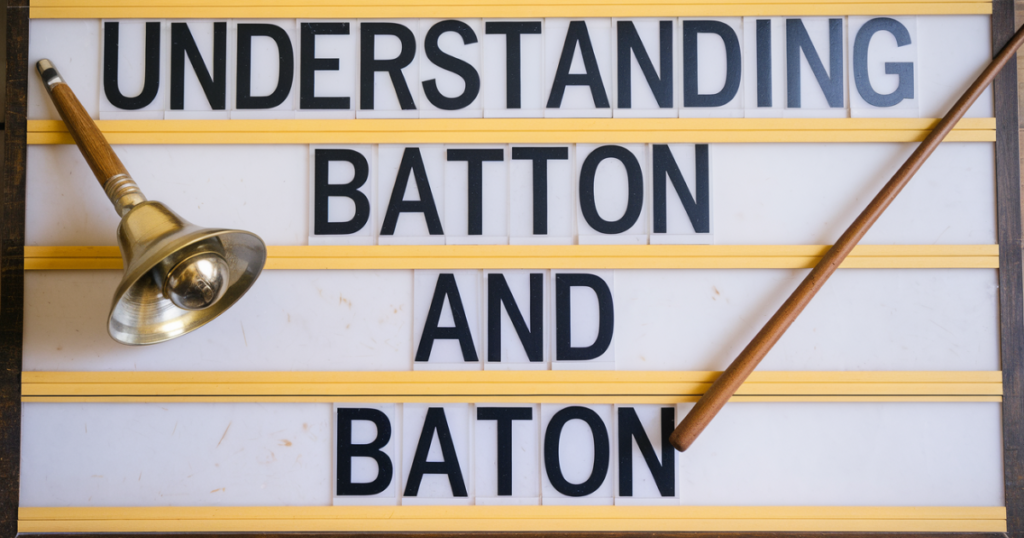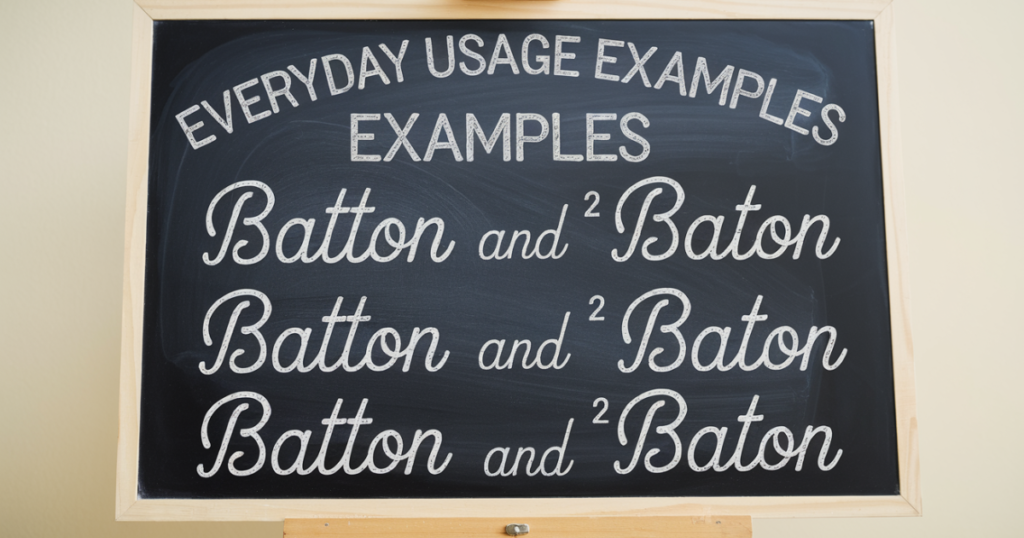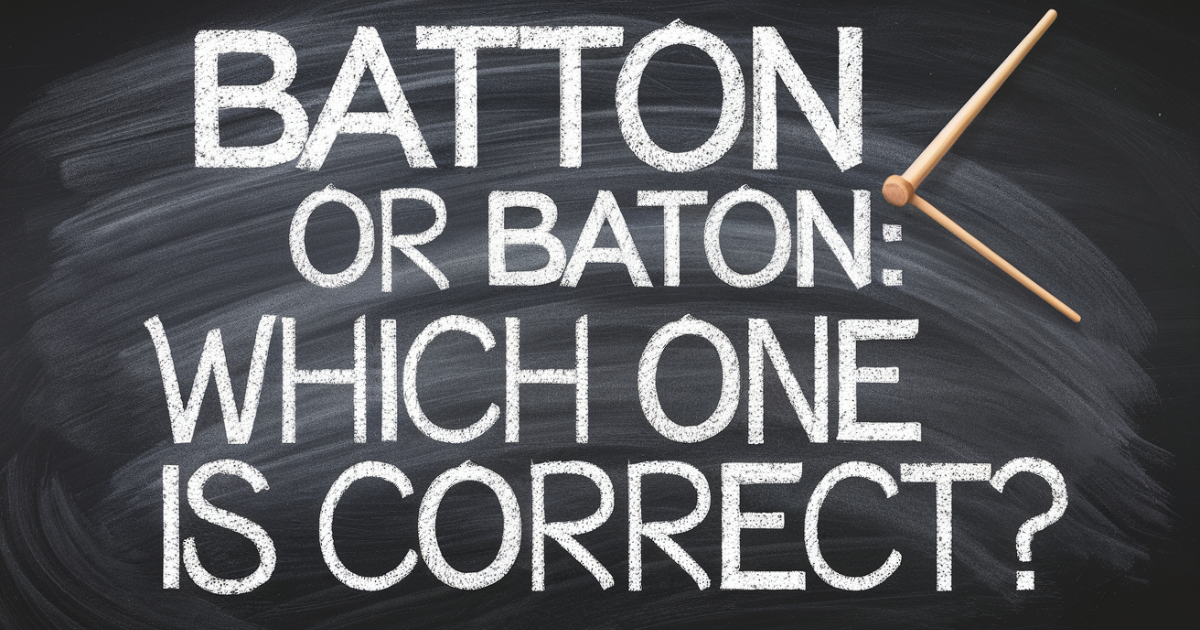When it comes to the words batton or baton, many people get confused about which one is correct. The difference may seem minor, but understanding the right spelling and usage can help you avoid common language mistakes. Both words exist in the English language, but they mean very different things.
“Baton” refers to a thin stick or rod used in various contexts, such as in music, where a conductor uses it to direct an orchestra, or in sports, like in relay races. On the other hand, “batton” is considered a misspelling. Let’s explore more about how to use “baton” correctly and avoid errors.
Understanding Batton and Baton

Batton: Definition and Usage
“Batton” is an incorrect spelling of the word “baton.” It is often mistakenly used, but it has no official meaning or use in the English language. The correct spelling, “baton,” refers to a thin stick used by a conductor or in relay races.
Examples
- Incorrect: The relay runner passed the batton smoothly to her teammate.
- Incorrect: The orchestra conductor raised his batton to signal the start of the performance.
Baton: Definition and Usage
A “baton” is a slender, cylindrical stick used in various contexts. In sports, it’s passed between runners in a relay race. In music, a conductor uses it to guide an orchestra’s performance. In law enforcement, a baton serves as a tool for officers to maintain order and protect themselves.
Examples
- In Sports: The sprinter handed the baton to the next runner in the relay race.
- In Music: The conductor raised his baton to signal the orchestra to begin playing.
- In Law Enforcement: The officer carried a baton as part of his standard equipment for crowd control.
You Also Like To Read This: Cancelation Or Cancellation: Which Is Correct?
Three Types Of Misspellings
Misspellings are common errors that occur when writing, often leading to confusion or misunderstandings. They can be categorized into three main types: phonetic misspellings, typographical errors, and wrong letter usage. Phonetic misspellings happen when a word is spelled how it sounds, like “definately” instead of “definitely.”
Typographical errors are simple mistakes made while typing, such as “teh” instead of “the.” Lastly, wrong letter usage refers to substituting letters, like using “recieve” instead of “receive.”
Featured Misspellings
Some misspellings are so frequent that they stand out. Examples include “accomodate” for “accommodate,” “seperate” for “separate,” and “occuring” for “occurring.” These featured errors often happen because of tricky letter patterns or double letters, making them challenging to get right. Highlighting these can help writers remember the correct spellings and avoid repeating these common mistakes.
Related Misspellings
Related misspellings occur when words are part of the same family or have similar structures. For example, the words “effect” and “affect” are commonly confused due to their similar pronunciation and related meanings. Another example is “their,” “there,” and “they’re,” where homophones make it easy to misuse them. Recognizing patterns among related words can reduce these errors significantly.
Grammar Rules And Examples
Understanding grammar rules is essential to minimize misspellings. For instance, the rule “i before e, except after c” helps with words like “believe” and “receive.” Additionally, knowing when to use homophones correctly, like “your” vs. “you’re,” can improve writing. Here are some examples:
- Correct: I believe we can achieve success.
- Incorrect: I beleive we can acheive success.
- Correct: They’re going to bring their supplies over there.
- Incorrect: Their going to bring they’re supplies over their.
Learning these rules and practicing them can greatly enhance your writing accuracy.
Side-by-Side Comparison
Here’s a quick comparison to help you easily distinguish between “batton” and “baton”:
| Word | Correctness | Definition | Common Usage | Key Differences |
| Batton | Incorrect | A misspelling with no official meaning | Rarely used, only as a mistake | “Batton” is not a valid word and should be avoided |
| Baton | Correct | A slender stick used in sports, music, or law enforcement | Widely used in relay races, orchestras, and by police officers | “Baton” is the correct spelling and used in multiple formal contexts |
The term “batton” is simply an incorrect spelling of “baton” and should not be used. “Baton,” however, has multiple valid uses: it’s passed between runners in relay races, used by conductors in orchestras, and serves as a tool in law enforcement. Using the correct spelling ensures clear communication in all contexts.
Everyday Usage Examples

Sports
- In the relay race, the runner quickly passed the baton to the next teammate.
- The coach emphasized the importance of a smooth baton exchange during practice.
Music
- The conductor held the baton high, guiding the orchestra through the symphony.
- She skillfully waved the baton to ensure the orchestra stayed in sync.
Law Enforcement
- The officer kept his baton ready while patrolling the area.
- During the protest, police officers used batons to manage the crowd.
Sports
- The athletes practiced their baton handoffs to perfect their timing.
- The race was thrilling, with each runner speeding up as they reached for the baton.
Music
- The conductor’s baton flew through the air, guiding the musicians with precision.
- The orchestra’s performance was flawless, thanks to the conductor’s baton work.
Law Enforcement
- The officer used the baton to maintain order during the tense situation.
- Police officers are trained in baton handling for situations requiring crowd control.
FAQs
Is it batton or baton?
The correct spelling is “baton.” “Batton” is a common misspelling and should be avoided.
How to pronounce baton?
“Baton” is pronounced as “ba-ton” (with a soft “t” sound). It rhymes with “cot” or “gone.”
What does baton mean?
A baton is a slender stick used by conductors to direct music, by runners in relay races, or by police officers for control. It has various applications in different fields.
Is it a police baton or batton?
It is a police baton. “Batton” is a misspelling, and the correct term is “baton” when referring to the tool used by law enforcement officers.
Conclusion
In conclusion, “baton” is the correct spelling for the slender stick used in various contexts such as sports, music, and law enforcement. The misspelling “batton” should be avoided, as it has no official meaning. Understanding the proper usage of “baton” ensures clearer communication and helps prevent errors in writing. Whether referring to a conductor’s baton or a police officer’s tool, the correct spelling matters. Always remember to use “baton” to maintain accuracy in your writing.

Grammerlytips.com, authored by Jame, offers expert tips and insights on mastering grammar, enhancing writing skills, and boosting communication effectiveness.

